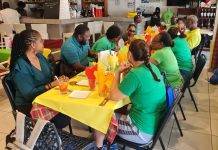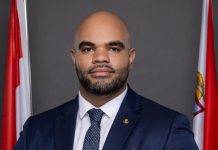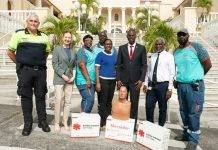PHILIPSBURG, Sint Maarten — Upon returning to Parliament after the summer recess, MP Grisha Heyliger-Marten reflected on the first 3,5 years of her first term in office. In doing so, she reiterated her great concerns for the manner in which the nation has been Governed during the current Parliamentary term, and the state of the nation’s democracy in general.
“Being in Parliament, one really gets a good picture of how the affairs of the people are being managed on a daily basis. And frankly speaking, I was shocked and continue to be surprised about two things. The first is the extent to which the structure of the Dutch Kingdom keeps our people from having their say and developing to their full potential based on their own wishes, needs, and paramount interests. The second, and more serious one, is the inability of the current Government to find structural solutions to this undesirable situation”, Heyliger-Marten stated in a press statement released on Sunday afternoon.
She further stated that while Parliaments and Governments throughout the Kingdom have acknowledged the need for these structural changes, the Government of St. Martin has not demonstrated to have the vision nor determination and fortitude to bring about these changes, despite formal support and advice from Parliament.
“Based on the negotiations and the statements received from Government related to the CRE/COHO, the refinancing of the Dutch COVID-related loans, the execution of the de Graaf and van Raak/Bosman motions, the planned Kingdom Conference, and regional cooperation and integration, just to name a few important issues, the current Government has proven to be incapable of presenting and protecting the interests of the people of St. Martin”, according to Heyliger-Marten.
“When it comes to the COHO debacle, it confirmed that St. Martin is still a colony, with the Dutch Government, via the Cft, still having the last word about what is best for our people. The fact that the COHO was morphed into so-called “Country packages” does not change that fact.
So unless we as a Parliament do not change the Kingdom Charter to comply with the peremptory norm of international law or get rid of it all together, St. Martin demands to be recognized as a Small Island Developing State (SIDS) with the right to development outside of the Kingdom’s conditional funding that the Netherlands provides as loans, the status quo will remain. To me and many others, that is not an option.
Unless we as a Parliament and Government secure the long-term sustainable development, food security, and financial-economic viability of our nation and people, and bring relief for particularly our seniors, we will have failed those who we represent and work for”, Heyliger-Marten said.
“In order to strengthen our democracy and ensure that the will of the people are always carried out, we need to do at least two things. The first is to provide Parliamentary factions with sufficient resources to perform their duties as representatives of the people. And the second one is to finalize the electoral reform.
These changes are relatively easy to make. However, and as is the case for all laws including the national budget, first and foremost the overarching issue of the restrictive and undemocratic Kingdom Charter needs to be permanently fixed.
Secondly, the Government needs to broaden its horizon beyond the Dutch Kingdom, wake up and see what is happening globally, and dare to engage the regional and global community for mutually beneficial cooperation and assistance”, Heyliger-Marten stated.
“This, however, will take determination, testicular fortitude, and foresight from those Governing our nation. It is my hope that the next Government will have these qualities and lead the people of St. Martin into a brighter future”, Heyliger-Marten concluded.






























